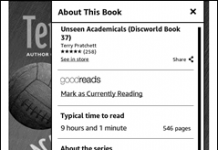 The first is the title of an article published in Communication and Critical/Cultural Studies, by Ted Striphas, the author of The Late Age of Print.
The first is the title of an article published in Communication and Critical/Cultural Studies, by Ted Striphas, the author of The Late Age of Print.
Here’s the abstract. The full article can be found here.
This paper focuses on the Amazon Kindle e-reader’s two-way communications capabilities on the one hand and on its parent company’s recent forays into data services on the other. I argue that however convenient a means Kindle may be for acquiring e-books and other types of digital content, the device nevertheless disposes reading to serve a host of inconvenient—indeed, illiberal—ends. Consequently, the technology underscores the growing importance of a new and fundamental right to counterbalance the illiberal tendencies that it embodies—a “right to read,” which would complement the existing right to free expression.
The second is and article on his blog that is an excerpt from an article he wrote for the National Communication Associations’s online magazine, Communication Currents, which was commissioned in anticipation of National Freedom of Speech Week. Here’s the excerpt from the article E-books: No Friends of Free Expression:
It may seem odd to suggest that reading has something to do with freedom of expression. It’s one thing to read a book, after all, but a different matter to write one. Nevertheless, we shouldn’t lose sight of the fact that reading is an expressive activity in its own right, resulting in notes, dog-eared pages, highlights, and other forms of communicative fallout. Even more to the point, as Georgetown Law Professor Julie E. Cohen observes, “Freedom of speech is an empty guarantee unless one has something—anything—to say…[T]he content of one’s speech is shaped by one’s response to all prior speech, both oral and written, to which one has been exposed.” Reading is an integral part of the circuitry of free expression, because it forms a basis upon which our future communications are built. Anything that impinges upon our ability to read freely is liable to short-circuit this connection.
I then go on to explore the surveillance activities that are quite common among commercially available e-readers; I also question how the erosion of private reading may affect not only what we choose to read but also what we may then choose to say
These articles take a look at ebooks from a unique and disturbing standpoint.

































Regarding Striphas’ statement, “It may seem odd to suggest that reading has something to do with freedom of expression…”
Not at all. As stated in the American Library Association’s Freedom to Read Statement, “Now as always in our history, reading is among our greatest freedoms.”
http://www.ala.org/ala/aboutala/offices/oif/statementspols/ftrstatement/freedomreadstatement.cfm
I love reading ebooks, but people need to understand the trade-offs involved. A wholesale switch to ebooks will only worsen the digital divide, and preservation of digital files is a huge challenge. A publisher (or the government) can’t easily delete or alter the books on your shelves. There is a big difference between your rights to a book you own and an ebook and software for which you have a license.
Of course, the publisher or government can’t easily delete or alter the eBooks I have which I’ve saved to an external hard drive.
Maybe it is telling that it costs $30 to read the article – more than triple the price of an average ebook.
It is indeed telling that the article costs $30 on the publishers’ website — but it’s only telling about the ways in which academic journal publishing has become something of a closed ecosystem as a result of publishers’ pricing policies.
For whatever it’s worth, I’m a strong advocate for reforming academic publishing and make significant efforts to make my own and others’ work freely available. On my website I offer to send a PDF copy of my article on Kindle to anyone who emails me.
It would be ironic, wouldn’t it, for a piece about the “right to read” to be inaccessible to readers?
Public Librarian mentions “There is a big difference between your rights to a book you own and an ebook and software for which you have a license.”
I dispute this and believe no superior court will uphold this if it were ever to be taken to court by a writer or publisher. When we buy an eBook we buy it lock stock and barrel, irrespective of what the seller may claim. Same with all software I buy.
Howard: last month, in Vernor v. Autodesk, the 9th Circuit Court of Appeals held that the terms of the license prevail. The only higher court in the US is the Supreme Court. https://www.eff.org/deeplinks/2010/09/magic-words-trump-user-rights-ninth-circuit-ruling